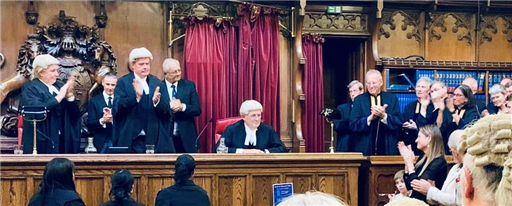
Wells Sharing: Commonplace or a Matter of Last Resort?
Published: 08/11/2024 17:00

The importance of the ‘clean break’ has been reemphasised in recent years with greater emphasis being placed on MCA 1973 s 25A (and s 28(1A)), particularly in the judgments of Mostyn J. For example, in Quan v Bray & Ors [2019] 1 FLR 1114, having referred at [48] to s 25A and s 28(1A) as having been ‘strangely neglected since they were enacted’, he stated that:
‘recent decisions have emphasised their key importance. A limited term should be imposed unless the court is satisfied that the claimant would not be able to adjust to a cut-off without undue hardship. Normally that decision is easily reached because the claimant will have a capital base to fall back on in her later years. Generally speaking, there would have to be shown good reasons why a term maintenance order should not be made. And, generally speaking, where a term maintenance order is to be made there would have to be shown good reasons why it should not be non-extendable. Ultimately the court’s goal should be wherever possible, to achieve, if not immediately, then at a defined date in the future, a complete economic separation between the parties.’
In Clarke v Clarke [2023] 2 FLR 1 the same judge reiterated this view (at [36]):1
‘xvii) Where an application for spousal periodical payments is actively pursued the court must diligently apply s 25A and consider whether the application can be dismissed and an immediate clean break effected. If the court concludes that a substantive order is needed to meet the applicant’s needs the court should only make the award in such amount and for such a period as to avoid the applicant suffering undue hardship. The applicant must show good reasons why a non-extendable term maintenance order should not be made. The court’s goal should be to achieve, if not immediately, then at a defined date in the future, a complete economic separation between the parties. The same principles apply, mutatis mutandis, where the court considers an application by a payer of spousal periodical payments for the variation or discharge of the order. The burden will be on the payee to justify a continuance of the order, and if so, for how long: SS v NS (Spousal Maintenance) [2015] 2 FLR 1124, Quan v Bray & Ors [2019] 1 FLR 1114.’
In Cummings v Fawn [2024] 1 FLR 117 likewise:
‘[29] As for the judge’s decision to impose a clean break, it seems obvious to me that the judge must, at least subconsciously, have applied principle (xvii) with which I augmented Peel J’s compendium of principles in WC v HC (Financial Remedies Agreements) [2022] EWFC 22 at [21] by my decision in Clarke v Clarke [2022] EWHC 2698 (Fam) at [36]. That principle states …
[30] I would suggest that this case amply demonstrates that the FRC judiciary is now asking itself the right question whenever it is suggested by an applicant that a clean break should not be imposed. That question is “Has the applicant demonstrated by clear and cogent evidence good reasons why there should not be a clean break?” and not “Has the respondent demonstrated why there should be a clean break?” I emphasise that, in order to comply with the terms of s 25A Matrimonial Causes Act 1973, a decision not to impose a clean break must be seen very much as the exception to the rule. The onus is on the applicant distinctly to prove by clear and cogent evidence that there should not be a clean break.
[31] The judge was right to answer the correct question negatively. The wife adduced no evidence, let alone clear and cogent evidence, which distinctly proved why, having regard to the finding concerning her earning capacity, a clean break should not be imposed.’
But to what extent does Wells sharing – often used where assets are presently illiquid and/or there are other reasons why they cannot currently be shared – offend against the clean break?
The Court of Appeal (arguably) suggested in Versteegh v Versteegh [2018] 2 FLR 1417 that the form of Wells sharing by which funds are paid by one party to the other when received by the former (usually by way of deferred contingent lump sums) is an anathema to the clean break and should therefore be avoided if at all possible. As Sir Jonathan Cohen noted in ES v SS [2023] EWFC 177:
‘[43] It is helpful at this juncture to set out the principles underlying the making of such a [Wells sharing] order. I adopt with respect the statement of King LJ at paragraph 151 of Versteegh, where she says:
“I fully accept that the making of a Wells Order is something that should be approached with caution by the court and against the backdrop of a full consideration by the court of its duty to consider whether it would be appropriate (per Section 25a of the MCA 1973) to make an order which would achieve a clean break between the parties.”
[44] In the same case Lewison LJ quoted Mostyn J in WM v HM (Financial Remedies: Sharing Principle: Special Contribution) [2018] 1 FLR 313 where at paragraph 24 he said:
“Generally speaking a Wells sharing arrangement … should be a matter of last resort, as it is antithetical to the clean break. It is strongly counter intuitive, in circumstances where one is dissolving the marital bond and severing as many financial ties as possible, one should be thinking about inserting the wife as a shareholder into the husband’s company …”
[45] But, I must not overlook paragraph 135 where reference is made to circumstances where any other course might lead to “considerable unfairness”.’
It may be ‘antithetical’ to the clean break but does this mean that it should be a ‘matter of last resort’ as Mostyn J described it in WM v HM? After all, in BJ v MJ (Financial Order: Overseas Trust) [2012] 1 FLR 667 the same judge said as follows:
‘[85] Mr Southgate argues that the arrangements in para [82](ii) [(ii) The assets and liabilities referable to the business are to be shared equally on a Wells basis] and (iv)(d) [A charge will be imposed on Green Farm in favour of the trustees of the new settlement] are not compliant with the clean break principle and cause messy long term inter-connections to be endured between H and W. Sometimes in order to achieve fairness the court has to reach for Wells sharing, or contingent lump sums (as in Charman), or deferred interests by way of a charge. These are commonplace. The court has to strive to make the break as clean as is reasonably possible, but I emphasise the qualification. Fairness is not to be sacrificed on the altar of finality.’
So should a Wells-sharing order be considered to be ‘commonplace’ or a ‘matter of last resort’? As so often the case in financial remedies it is arguable (and with apologies to Newton’s Third Law of Motion) that for every case there is an equal and opposite one. But this is perhaps all but inevitable in a jurisdiction where so much turns on how the court considers it can best achieve objective fairness (or prevent unfairness) between the parties.









